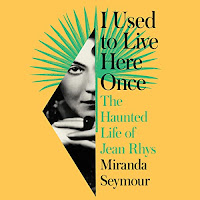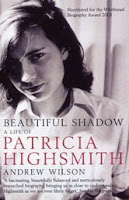"It was Diana Brackley who put the milk out for the cat; who dropped a speck of lichen in it by mistake; who noticed how the lichen stopped the milk turning.
But it was Francis Saxover, the famous biochemist, who carried on from there; who developed Antigerone, the cure for ageing; who then tried to suppress a discovery which was certainly in the megaton range.
And so it was Diana Brackley who went to town with Antigerone in one of John Wyndham's gayest and most satirical forays into the fantastic.
'If even a tenth of science fiction were as good, we should be in clover' - Kingsley Amis in the Observer"
It's a remarkable feat, a big science-fiction idea about the way science can affect social change, drawing, I think from the impact of penicillin and of the Suffragette movement, and all conveyed here as light romcom. Brian Aldiss famously criticised Wyndham for writing "cosy catastrophe", but this is all-out fun.
Antigerone slows the biological process, so those who take it do not age. The trouble of the title is that there's only enough of the lichen to make this wonder drug for at most 4,000 people. The result is lots of debate on the ethics of announcing the discovery, let alone deciding who might share its benefits.
Diana is a brilliant character, a young, determined woman with a habit of shocking people by saying the wrong thing - or rather what she thinks. At eighteen, she's asked by a schoolteacher whether her parents are proud of her academic success. Diana responds immediately that her "Daddy's very pleased", but can't say the same for her mother.
"'She tries. She's really been awfully sweet about it,' said Diana. She fixed Miss Benbow with those eyes again. 'Why is that mothers still think it so much more respectable to be bedworthy than brainy?' she inquired. 'I mean, you'd expect it to be the other way round.'
Miss Benbow replies, carefully, that "comprehensible" might be a better word that "respectable", and suggests the possibility that, "when the daughter of a domestic-minded woman chooses to have a career she is criticising her mother by implication".
"'I hadn't looked at it that way before,' Diana admitted thoughtfully. 'You mean that, underneath, they are always hoping that their daughters will fail in their careers, and so prove that they, the mothers, I mean, were right all the time?'" (pp. 12-13)
Diana soon has a career as a brilliant scientist who also likes to look good, and sees no contradiction in using the cutting-edge science she's developed as a beauty treatment for other women. In fact, she sees how the cosmetic aspects of the new discovery can advance the feminist cause. It's not exactly what you expect from a male sci-fi writer of this vintage.
Several of the traits Diana exhibits align with what we'd now think of as autistic and it's refreshing to read a decades-old book that celebrates such diversity. They make her a better character and better person. Sadly, Saxover is less engaging and there's little to explain Diana's long-lasting attraction. His attitude to other women doesn't exactly do him any favours - over pages 25 and 26, he lists the young women who have caused chaos at his laboratory by falling for the men, the women the ones at fault.
Other things are discomforting from a modern perspective. There's a racist joke on page 196 and a general ease with the idea that resources in China should be for the exclusive use of people in the UK. This may be part of the satire. As the situation gets ever more serious, with moral quandaries leading to kidnap and murder, the lightly comic love story gets a little tangled.
"There could have been bloodshed even something like a civil war,"
says one character on page 200, justifying a rash course of action. But there has been bloodshed: this speech comes just 18 pages after an old watchman, Mr Timpson, is killed by the blow from a cosh, a man called Austin is hospitalised and Saxover barely survives a planned arson attack on his home.
I think that mismatch is down to the effort to bridge different forms: science-fiction with the satirical, fantasy on the cusp of what's credible. It's a balancing act, and one that doesn't wholly work in this instance, but it's fascinating to see tried in this way. In fact, that balance is what Wyndham talked about in a 1960 interview for the BBC magazine programme Tonight at the time of publication. How boggling to see him justify this approach and discuss the mechanics of genre on the equivalent of The One Show.
































